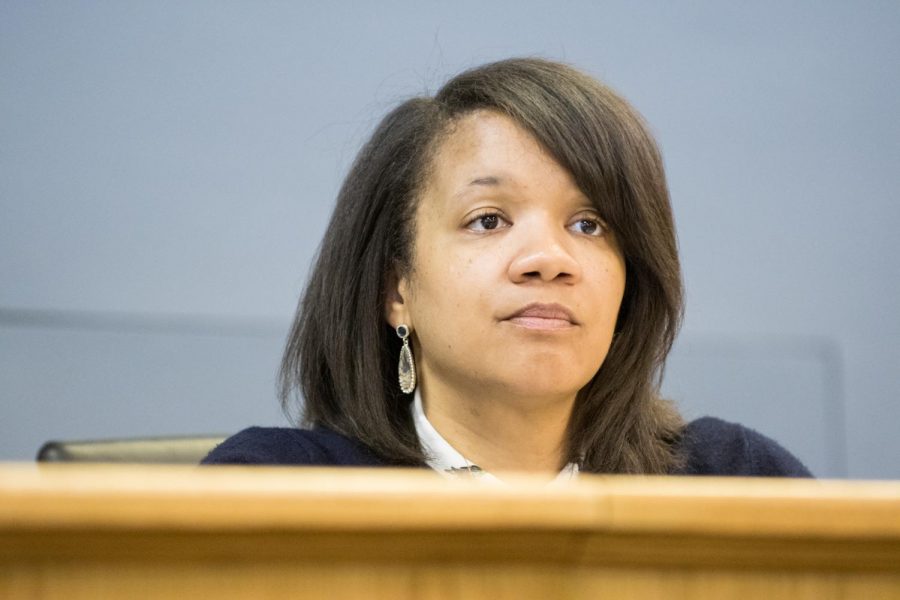City hosts second town hall on Evanston reparations fund
Daily file photo by Colin Boyle
Ald. Robin Rue Simmons (5th). Rue Simmons hosted a Thursday town hall to discuss Evanston’s reparations fund.
May 22, 2020
Just over 100 participants gathered through Zoom on Thursday for a virtual town hall on Evanston’s historic reparations fund.
The fund, established through a city resolution passed in November 2019, will consist of revenue from the cannabis sales tax and aim to address the continued disenfranchisement of black residents through the legacy of slavery. Ald. Robin Rue Simmons (5th) said the reparations subcommittee will develop initiatives in sectors residents have indicated as top priorities: housing, business development and education.
Kamm Howard, national co-chairperson for the National Coalition of Blacks for Reparations in America, said choosing these initiatives is the final step of the city’s reparations model.
“Reparations are any resources, no matter how large or how small, no matter how narrowly or broadly administered,” Howard said. “If these resources are targeted towards the repair or healing of current injuries from past harms, it is in fact reparations.”
U.S. Rep. Sheila Jackson Lee (D-Texas) said the importance of reparations has become clear through the COVID-19 outbreak, which has disproportionately impacted black Americans.
Black Americans have died from COVID-19 at a rate more than double that of any other racial group, Jackson Lee said. Although these disparities are partly explained by pre-existing health problems such as hypertension and diabetes, which disproportionately impact the black community, she said the problem reveals deeper inequalities.
“The alarming rates which COVID-19 is killing black Americans really extends beyond these core morbidities and can be attributed to the decades of spatial segregation (and) inequitable access to testing and to healthcare,” Jackson Lee said.
Ald. Ann Rainey (8th), a member of the reparations subcommittee, said the city projects $10 million in funding for the program over the next 10 years, which will come from a 3 percent tax on recreational cannabis sales.
Collection of the 3 percent tax will begin on July 1, and the revenue generated will be transferred to the city quarterly. Based on cannabis sales since January, the tax would have collected approximately $450,000 if it was in place, putting the city on track to meet funding goals, Rainey said.
“Our public funding is going to be as we planned once it’s activated,” Rainey said. “We’re not going to be short any money.”
Rainey said Illinois was supposed to issue 75 new dispensary licenses this month, 47 of which would be allocated to a nine-county area that includes Evanston. However, the process was delayed because of the pandemic and a high application volume.
Even one or two additional licenses in Evanston would make a big difference for the reparations fund, Rainey said.
“We don’t know when the governor is going to release these licenses, we don’t know who’s going to get them, but just keep hoping that we’re going to get a couple of them,” Rainey said. “The more we get, the better off our program is going to be.”
In addition to public funding, Rue Simmons said the reparations fund is looking to expand the scope of its private funding through donations from supporting parties and other avenues.
At the end of the event, Rev. Michael Nabors from the Second Baptist Church, reminded attendees of the history behind the reparations fund.
“Right here in Evanston, Illinois, we are pioneering a victory dance hundreds of years in the making,” Nabors said. “May our progress and our plan be nothing less than a template, not only for blacks in Evanston but for the 1,287,767 blacks in Cook County, the 1,866,414 blacks in Illinois, and the over 25 million blacks in the United States.”
Email: keertigopal2021@u.northwestern.edu
Twitter: @keerti_gopal
Related stories:
— Reparations subcommittee evaluates program for black homebuyers
— Equity and Empowerment Commission discusses racial disparity and reparations
— Equity Commission discusses reparations plans, reconciliation initiative



